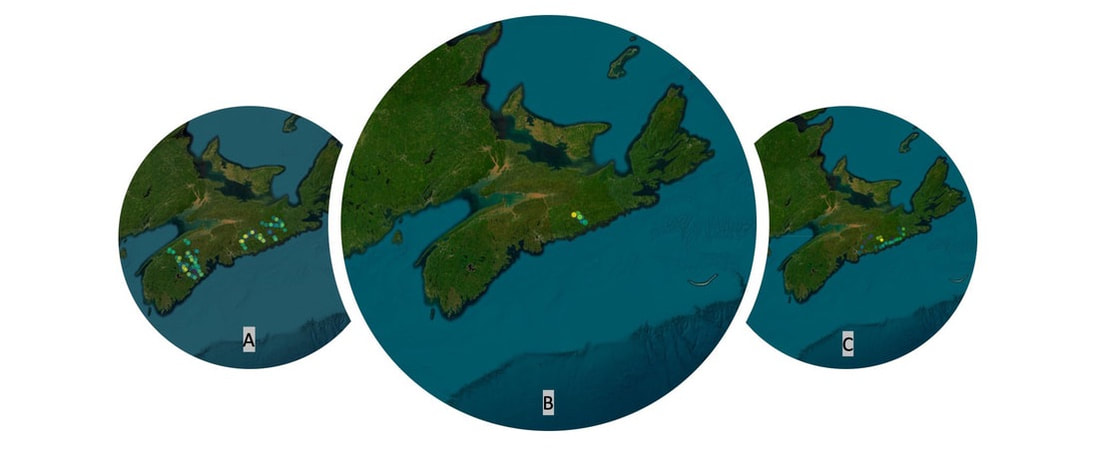|
Data rescue intern : Rolando Trejo-Pérez, Institut de recherche en biologie végétale (IRBV), Université de Montréal During the summer 2023, I participated in a rescue data internship as part of the Data Management and Reproducible Research program. The primary goal of this internship was to transform and clean water quality and temperature data provided from the Nova Scotia Salmon Association (NSSA) into the DataStream schema. This transformation and cleaning were accomplished using reproducible R scripts, ensuring consistency and transparency in the data conversion process.  Figure 1. Map of the sites included in A) W.A.T.E.R. (Watershed Assessments Towards Ecosystem Recovery) project, B) WRSH (West River, Sheet Harbour) Acid project, and C) Oceans North project. Source: Leaflet/ Tiles © Esri-Source: Esri, i-cubed, USDA, USGS, AEX, GeoEye, Getmapping, Aerogrid, IGN, IGP, UPR-EGP, UPR-EGP, and GIS User Community. The Nova Scotia Salmon Association (NSSA) is a charitable conservation organization focused on the wise management and preservation of wild Atlantic salmon and trout stocks. They've implemented solution-oriented programs to tackle provincial-scale issues, including its now 17-year acid precipitation through the West River, Sheet Harbour Acid Mitigation Program, and habitat loss and degradation through the Adopt-a-Stream Program. NSSA has amassed significant water quality and temperature data, aiming to make it easily accessible to the public. A viable solution for this is to archive the data in the DataStream portal, a charitable organization dedicated to supporting water monitoring groups in sharing data at a regional scale, using consistent and rigorous data standards that promote data reuse.
There were 3 NSSA datasets to be archived on Atlantic DataStream Initiative:
During my internship I accomplished to archive two datasets in the DataStream portal, the data coming from the Southern Upland W.A.T.E.R project and the Oceans North project. These datasets are currently under embargo and will become accessible in September 2024 at https://atlanticdatastream.ca. Additionally, I pre-processed the data from the WRSH Acid Rain project to prepare it for transformation into the DataStream schema. Throughout this internship, I leveraged my skills in the R programming language to create the final product, which consists of .csv files for each project. This .csv files contain all the transformed and cleaned data essential not only for data visualizing within DataStream but also for public download, catering to those interested in accessing and utilizing this valuable Canadian data. This Living Data Project was done in partnership with The Nova Scotia Salmon Association (NSSA) and DataStream Initiative from The Gordon Foundation. I would like to extend my heartfelt thanks to Amy Weston, Edmund A. Halfyard, Aislin Livingston, Meghan McLeod and Mike Lavender for their invaluable support during my summer internship. I am looking forward to seeing the public accessibility of this data in the coming months! Comments are closed.
|
Archives
October 2023
Categories |

 RSS Feed
RSS Feed